Crit'Air and clean air zones

High pollution levels are a particular issue in some of the larger urban areas across France. These often peak during the summer season, where warm weather and no winds can result in dangerous levels of smog forming.
In order to help combat this issue, the French government has introduced clean air zones across the country, which impose a ban on the most polluting vehicles from urban centres. Most are permanent, whilst a smaller number of (generally) larger zones are implemented when air pollution hits a certain level.
In order to comply with the emissions regulations, all vehicles being driven within a clean air zone must display a Crit'Air vignette in their windscreen. This small sticker states which category the vehicle is assigned to, depending on their emissions (and consequently their age):
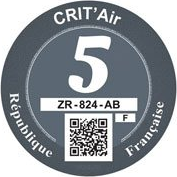 |
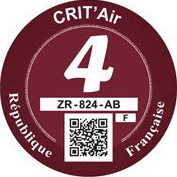 |
 |
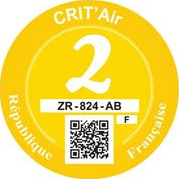 |
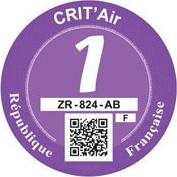 |
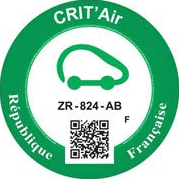 |
||||||
| Petrol & other fuels | - | - | 1997 - 2005 | 2006 - 2010 | 2011 - present | Zero emission | |||||
| Diesel | 1997 - 2000 | 2001 - 2005 | 2006 - 2010 | 2011 - present | - | - |
Vehicles registered before 1997 do not qualify for Crit'Air, and so are automatically banned when any restriction is imposed.
Any vehicle that enters a clean air zone withouth a Crit'Air sticker on display is liable to a fine of either €68 (light vehicles) or €135 (HGVs and buses), which will also apply to any foreign vehicles that are caught.
Clean Air Zone locations
Permanent Zones - Zones à faibles émissions (ZFE) or Zones à faibles émissions - mobilité (ZFE-m)
From 2025, urban areas with a population of over 150,000 have to introduce a low emission zone if air pollution levels exceed certain thresholds. Restrictions are more stringent in Paris and Lyon because pollution levels are stubbornly high, whereas Grenoble and Montpellier have voluntarily applied these restrictions.
Other cities have lower levels so can allow some older vehicles, although this could be tightened should pollution increase for long periods.
Low emission zones are signposted thus, this example stating that traffic is prohibited, except (sauf) categories E, 1, 2 and 3:
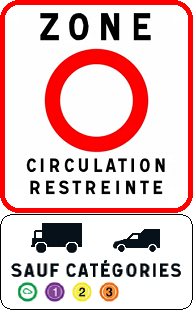
|
Areas restricted to vehicles with
|
||
| Grand Lyon Métropole | Paris Métropole (area within A86)* | Grenoble - Alpes Métropole** |
| Montpellier Métropole | ||
|
* - Crit'Air 3 vehicles
are banned 8am to 8pm Monday to Friday. |
||
|
Areas restricted to vehicles with
|
||
| Aix - Marseille - Provence Métropole | Clermont-Ferrand | Nice - Côte d’Azur |
| Reims | Rouen - Normandie Métropole | Saint-Etienne Métropole |
| Strasbourg Eurométropole | Toulouse Métropole | |
|
ZFE-m "vigilance" areas restricted to vehicles with
|
||
| Pays Basque (Bayonne - Biarritz) | Nancy* | |
| * - light vehicles with Crit'Air 5 also permitted | ||
|
ZFE-m "vigilance" areas restricted to vehicles with
|
||
| Angers | Annessy | Annemasse |
| Bordeaux | Caen | Chambéry |
| Le Havre | Lille Eurométropole | Nantes |
| Nîmes | Pau | Perpignan (from 2026) |
| Rennes | Tours | Valanciennes |
There are a number of other cities that were due to introduce low emission zones from 2025, however these have been declared as no longer necessary; their air quality levels have remained sufficiently good enough to permit a permanent exemption.
Additionally, many smaller towns have permanent prohibitions situated in the very centre, typically covering a small number of narrow streets where pedestrian numbers are highest.
Temporary Zones - Zones de Protection de l’Air
(ZPA)
There are a number of areas where Crit'Air applies on a
temporary basis, when air pollution is at unusually high levels. Whereas the
ZFEs are confined to urban areas, these ZPAs usually cover the
entire département. They also allow for tighter restrictions to be applied
when compared with the ZFEs.
| Bouches-du-Rhone / Marseille | Eure et Loir / Chartres | Creuse / Guéret |
| Côte-d'Or / Dijon | Deux-Sèvres / Niort | Drôme / Valence |
| Gers / Auch | Gironde / Bordeaux | Haute Savoie / Annecy |
| Hérault - Montpellier | Isère | Loiret / Orléans |
| Maine et Loire / Angers | Puy-de-Dôme / Clermont-Ferrand | Pyrénées-Atlantiques / Pau |
| Rennes | Savoie / Chambéry | Vallée de l’Arve |
| Vendée / La Roche-sur-Yon | Vienne / Poitiers |
Local reports will advise of when these are in operation, and are updated on the free Green Zones app. Where they overlap with a permanent zone, ZPAs will always take precident as restrictions may be tighter than under normal conditions.
Applying for a sticker
You can apply for your Crit'Air sticker from the official website. Ordering the sticker is quite easy, and should only take about 5 minutes.
You'll also need to take a photo or scan of your vehicle's registration document, as this will need to be uploaded to the site - it confirms the vehicle's details and is used to ensure you receive the correct sticker.
Don't fall for unofficial sites claiming they can offer a faster service, or do the job for you! They will probably charge a lot more and there's no guarantee you'll receive your sticker.
The sticker costs €3.72 including postage, and is valid for the lifetime of the vehicle. It does take a couple of weeks for you to get your sticker, but you will be emailed a pdf receipt, which you can display in your windscreen should you not receive it in time.